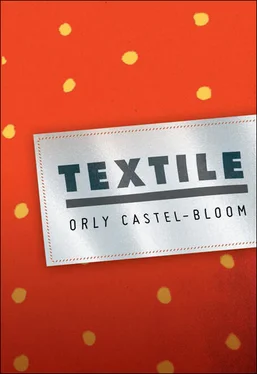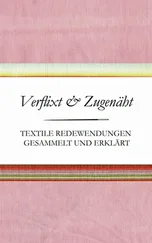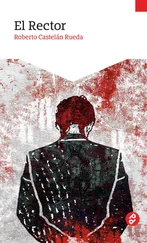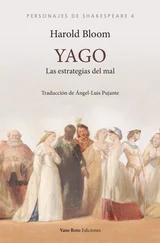The arguments between Mandy and Lirit on this subject had been completely wiped out of his memory. Lirit would drink hot drinks from a mug without using a coaster. If there was one thing Mandy couldn’t stand, it was rings on tables. In other people’s houses too, she would wonder how they could leave rings on tables that had cost thousands of dollars. It seemed crude and Israeli to her.
“Where is she?” Propheta asked again after blowing on his cup.
“Sleeping,” said Gruber.
“You don’t know how happy I am now,” Propheta said suddenly, as if this time there was something special in the chai, “You know, just talking Hebrew. Not that I have a problem with English. I speak English like an American, I pick up languages quickly. It goes without saying that if I taught Hebrew in Montpellier, French isn’t a problem for me either, but when I speak Hebrew,” his eyes shot sparks of happiness, “I can give my facial muscles a rest. And relaxing the facial muscles relaxes areas in my brain. And I won’t say it isn’t a pleasure. And this is after living outside Israel for years.”
He sat down on the sofa next to Gruber, not in order to watch the end of the movie, but in order to speak Hebrew.
Gruber pretended to be radically interested in the movie. He narrowed his eyes in order to catch every word, even though it wasn’t up to the eyes to hear, and Propheta understood his body language and kept quiet.
“What do you think of her house?” he asked after a while.
“I don’t know what to tell you,” said Gruber, who, because he was so surprised by the question, answered it honestly, “On the one hand it’s young girl’s apartment, and on the other hand an old woman’s, with all this pseudo-antique kitsch. There’s no direction. Did you see the photograph of Richard Nixon? What’s the nature of her relationship with the Hispanic bio-technologist?”
“I think pure sex, and that it’s over. Ever since the business of Reform Judaism came into the picture, she put a stop to it, because he’s uncircumcised.”
Gruber paid no attention to his words and continued:
“My wife wouldn’t have looked at this place even if it was on the seashore. My wife really likes living next to the sea. When she was a child she lived in Tel Aviv not far from the sea, and ever since then the sea is an essential view-supplement for her.”
“Do you live next to the sea?” asked Propheta, listening with half an ear.
“No. We live in Tel Baruch North. Do you know it?”
“I’m from Motza, next to Jerusalem.”
“Tell me, do you think I don’t know that Motza is next to Jerusalem?”
“Until the age of fifteen,” added Propheta. “After that we moved to Beit Zayit. My parents are still there. In a retirement village, but every day at five in the morning they go to the pool.”
Gruber didn’t ask him if he missed the views of the Jerusalem hills because he wasn’t interested, and in any case, Bahat McPhee was coming down the stairs in neurotic overload. She needed her pills. By the way she walked Propheta could tell that she was suffering from some chemical deprivation or other and that there was no point in talking to her until the chemistry kicked in.
Gruber, ignorant of the problem, stood up.
“Hi, good morning to you.”
She didn’t answer. She walked past them on her way to the kitchen, returned with a bottle of Coca-Cola she had taken out of the fridge, and swallowed the pills clenched in her fist with the help of a sip straight from the bottle.
Gruber said, “In our family everyone has his own drink. My wife introduced this rule so that no one would drink from anyone else’s bottle, on grounds of hygiene.”
“Do you want to drink cola from a bottle?” asked Bahat quietly. “I have a stock of bottles. But not cold.”
“I never drink straight from the bottle,” said Gruber, untruthfully.
Propheta felt a little pang of jealousy, but which he knew was not legitimate. Although he realized that Bahat was not yet focused, he was insulted by the fact that she had not responded to his presence. He hadn’t expected her to fall into his arms, but nor had he expected her to ignore him.
McPhee wondered if she had given him some kind of hint to come. And even if she had, it was a mistake, and she wanted to get rid of him.
But Propheta was determined to protect Bahat McPhee and had no intention of leaving her alone with any devious Israelis. If she didn’t realize that she was being exploited, then thank God he was here. The woman was about to give away to Israel information she had worked on for years, often at the expense of her social life. He thought that if she was really going to give them the right answers, then she had to demand money in return. And there was no reason for her to tell the rabbi from Albany about it. Not everyone had to know everything about everybody.
But he knew that McPhee was set on feeling noble, and that if she took even a single dollar from the Israeli she would feel as if she had betrayed herself.
Bahat, in the end, was a very lonely woman. People who used to be her friends and who used to call her occasionally had deserted her out of consideration because they had persuaded themselves that they didn’t want to disturb the genius at her research. Because of everything she had gone through in her life, and because of her years of loneliness, she tended to lose her sense of proportion and she needed someone to supervise her judgment. Which is where he, Propheta, came into the picture.
He held the opinion that she had been through enough, by which he meant the affair with Emily Boston, and the whole mess that came after it when Randall left her his parents to take care of until the day they died.
He wasn’t going to let anyone hurt this woman, whom he regarded as an angel in human form.
The truth was that Propheta was in love with her, but he knew that she couldn’t stand him physically. To him Bahat was a breath of fresh air in his world, and her social isolation touched his heart. She was mistaken in thinking that when she was a Reform rabbi she would meet people in the framework of her routine, and that they would have to be nice to her, that she would make friends with some of them, and then perhaps she would also find some lover she could stand physically and in whom she would find all the qualities her heart desired, at least for a few years because she was already sick to death of being with spiders all day long.
Propheta was also suspicious of the rabbi from Albany, but he had no way of approaching her. What kind of a person was she? How could the rabbi allow this woman — who anyone could see had been disappointed by the world and who was acting out of utter despair — to pour years of her hard work into the hands of the Israelis? If he understood correctly, she was actually giving up her chance for a Nobel here, and perhaps even risking her liberty. Harming the security of the United States was the last thing she needed.
On the other hand, the danger to relations between the USA and the State of Israel didn’t interest him so much as a hair of his mustache, which had once been ginger and was now a yellowish gray. On this point Propheta thought that as a logistics officer in the reserves he was no mean strategist because he was perhaps the only one here who thought things through to the end.
BAHAT SAW THE TRANSMISSION of information to Gruber as an excellent way out of the condition of being buried alive that she had organized for herself over the past few years. When she set the two things opposite each other — the modification of the gene responsible for the activity of the spinning glands in the spiders, opposite the title of Reform rabbi, which meant a lively social life, and what’s more, one without feeling that she was imposing herself on people because she would be serving them by the very fact of her presence — it was very clear to her which of the two she preferred.
Читать дальше












